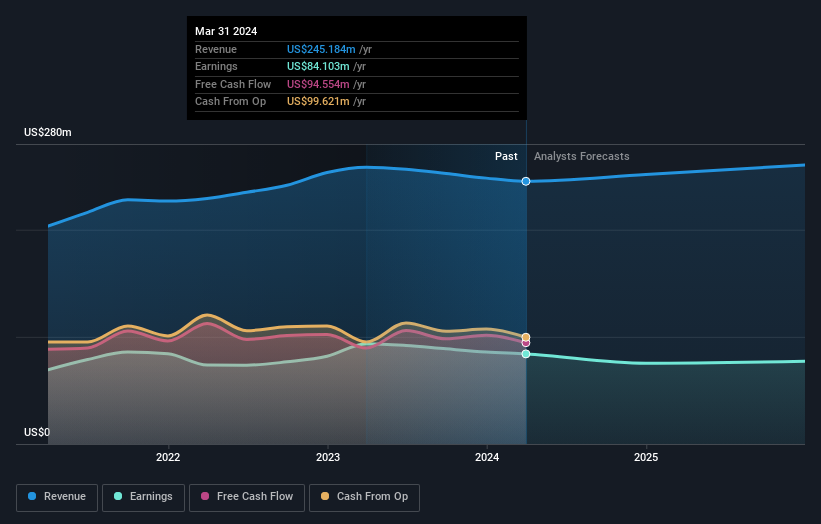German American Bancorp, Inc.'s (NASDAQ:GABC) institutional investors lost 5.6% last week but have benefitted from longer-term gains
Key Insights
Institutions' substantial holdings in German American Bancorp implies that they have significant influence over the company's share price
47% of the business is held by the top 25 shareholders
A look at the shareholders of German American Bancorp, Inc. (NASDAQ:GABC) can tell us which group is most powerful. We can see that institutions own the lion's share in the company with 49% ownership. Put another way, the group faces the maximum upside potential (or downside risk).
Institutional investors was the group most impacted after the company's market cap fell to US$952m last week. However, the 17% one-year returns may have helped alleviate their overall losses. We would assume however, that they would be on the lookout for weakness in the future.
Let's take a closer look to see what the different types of shareholders can tell us about German American Bancorp.
See our latest analysis for German American Bancorp
What Does The Institutional Ownership Tell Us About German American Bancorp?
Institutions typically measure themselves against a benchmark when reporting to their own investors, so they often become more enthusiastic about a stock once it's included in a major index. We would expect most companies to have some institutions on the register, especially if they are growing.
We can see that German American Bancorp does have institutional investors; and they hold a good portion of the company's stock. This can indicate that the company has a certain degree of credibility in the investment community. However, it is best to be wary of relying on the supposed validation that comes with institutional investors. They too, get it wrong sometimes. When multiple institutions own a stock, there's always a risk that they are in a 'crowded trade'. When such a trade goes wrong, multiple parties may compete to sell stock fast. This risk is higher in a company without a history of growth. You can see German American Bancorp's historic earnings and revenue below, but keep in mind there's always more to the story.
German American Bancorp is not owned by hedge funds. The company's largest shareholder is BlackRock, Inc., with ownership of 7.8%. For context, the second largest shareholder holds about 5.7% of the shares outstanding, followed by an ownership of 4.7% by the third-largest shareholder.
A deeper look at our ownership data shows that the top 25 shareholders collectively hold less than half of the register, suggesting a large group of small holders where no single shareholder has a majority.
While studying institutional ownership for a company can add value to your research, it is also a good practice to research analyst recommendations to get a deeper understand of a stock's expected performance. There are plenty of analysts covering the stock, so it might be worth seeing what they are forecasting, too.
Insider Ownership Of German American Bancorp
While the precise definition of an insider can be subjective, almost everyone considers board members to be insiders. Management ultimately answers to the board. However, it is not uncommon for managers to be executive board members, especially if they are a founder or the CEO.
Most consider insider ownership a positive because it can indicate the board is well aligned with other shareholders. However, on some occasions too much power is concentrated within this group.
Our most recent data indicates that insiders own some shares in German American Bancorp, Inc.. In their own names, insiders own US$47m worth of stock in the US$952m company. This shows at least some alignment. You can click here to see if those insiders have been buying or selling.
General Public Ownership
With a 45% ownership, the general public, mostly comprising of individual investors, have some degree of sway over German American Bancorp. While this group can't necessarily call the shots, it can certainly have a real influence on how the company is run.
Next Steps:
It's always worth thinking about the different groups who own shares in a company. But to understand German American Bancorp better, we need to consider many other factors. For example, we've discovered 1 warning sign for German American Bancorp that you should be aware of before investing here.
If you are like me, you may want to think about whether this company will grow or shrink. Luckily, you can check this free report showing analyst forecasts for its future.
NB: Figures in this article are calculated using data from the last twelve months, which refer to the 12-month period ending on the last date of the month the financial statement is dated. This may not be consistent with full year annual report figures.
Have feedback on this article? Concerned about the content? Get in touch with us directly. Alternatively, email editorial-team (at) simplywallst.com.
This article by Simply Wall St is general in nature. We provide commentary based on historical data and analyst forecasts only using an unbiased methodology and our articles are not intended to be financial advice. It does not constitute a recommendation to buy or sell any stock, and does not take account of your objectives, or your financial situation. We aim to bring you long-term focused analysis driven by fundamental data. Note that our analysis may not factor in the latest price-sensitive company announcements or qualitative material. Simply Wall St has no position in any stocks mentioned.

 Yahoo Finance
Yahoo Finance 

